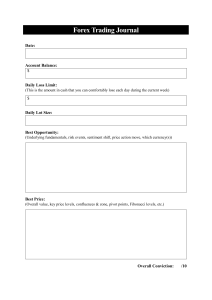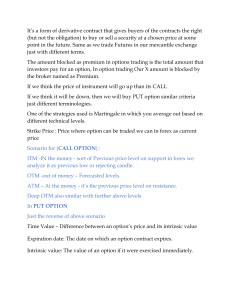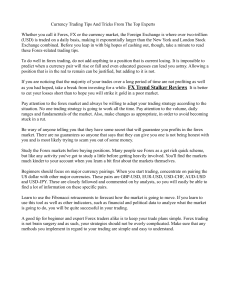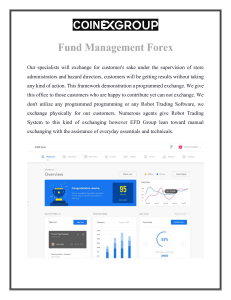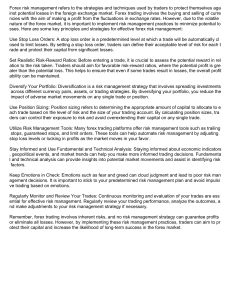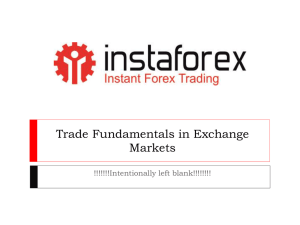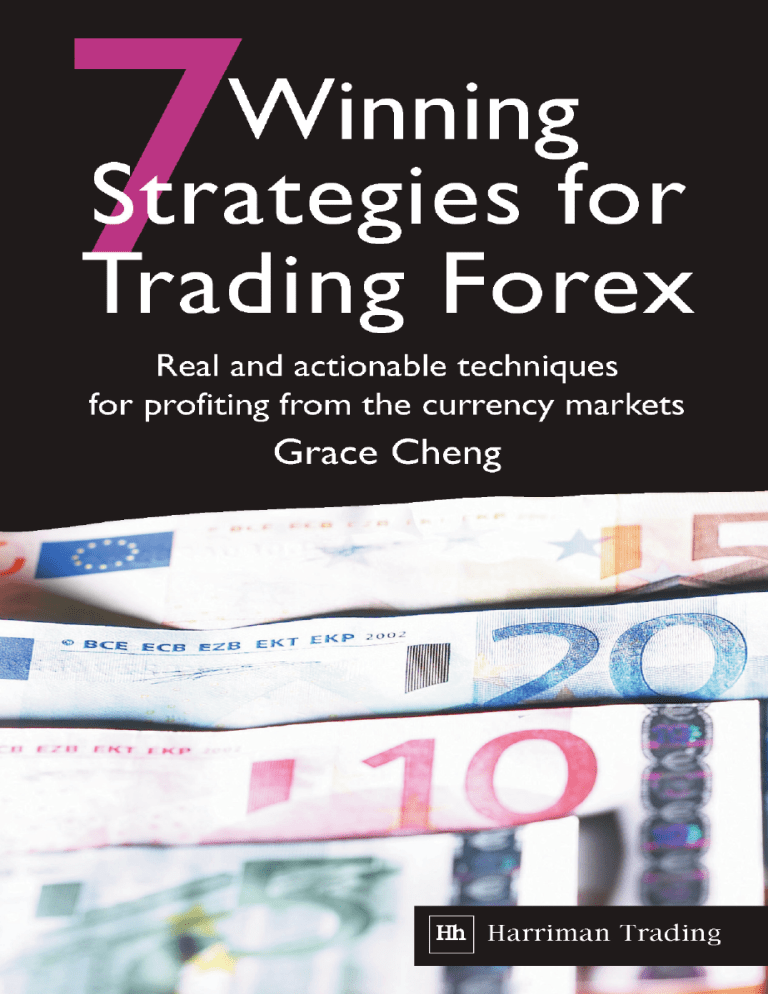
• • • • Sample • • • • Winning Strategies for Trading Forex Real and actionable techniques for profiting from the currency markets Grace Cheng HARRIMAN HOUSE LTD 3A Penns Road Petersfield Hampshire GU32 2EW GREAT BRITAIN Tel: +44 (0)1730 233870 Email: enquiries@harriman-house.com Website: www.harriman-house.com First published as Hardback in Great Britain in 2007 by Harriman House. This edition published in 2011 Copyright © Harriman House Ltd The right of Grace Cheng to be identified as the author has been asserted in accordance with the Copyright, Design and Patents Act 1988. 978-0-857190-90-1 British Library Cataloguing in Publication Data A CIP catalogue record for this book can be obtained from the British Library. All rights reserved; no part of this publication may be reproduced, stored in a retrieval system, or transmitted in any form or by any means, electronic, mechanical, photocopying, recording, or otherwise without the prior written permission of the Publisher. This book may not be lent, resold, hired out or otherwise disposed of by way of trade in any form of binding or cover other than that in which it is published without the prior written consent of the Publisher. No responsibility for loss occasioned to any person or corporate body acting or refraining to act as a result of reading material in this book can be accepted by the Publisher, by the Author, or by the employer of the Author. Designated trademarks and brands are the property of their respective owners. I dedicate this book to my husband, Pedro. Thank you for your constant encouragement, support and love. This book is also dedicated to my loving parents who have always believed in me. Contents About the Author vii Preface ix Introduction Part I: Trading Forex xiii 1 1: Getting Started 2: Spot Forex Market Structure 29 3: How To Overcome The Odds Of Trading Forex 41 4: The Ten Rules For Forex Trading 57 Part II: Strategies 3 61 5: Strategy 1 – Market Sentiment 63 6: Strategy 2 – Trend Riding 83 7: Strategy 3 – Breakout Fading 109 8: Strategy 4 – Breakout Trading 131 9: Strategy 5 – Decreased Volatility Breakout 153 10: Strategy 6 – Carry Trade 175 11: Strategy 7 – News Straddling 189 Appendices 211 Forex Glossary 213 Currency Codes 225 Major Regulatory Agencies 232 Index 233 v About The Author Grace Cheng is an experienced, full-time forex trader who is well-versed in technical, fundamental and sentiment analysis, which she utilises in her trading. She occasionally writes for trading and investment publications such as Technical Analysis of Stocks & Commodities, The Trader’s Journal and Smart Investor, as well as for online financial portals such as Investopedia. She has also been featured in newspapers, magazines, newsletters and on TV. Grace is the creator of the PowerFX Course which is designed for both new and intermediate traders to jump-start their trading performance. Grace has mentored hundreds of independent traders through her PowerFX Course. Her web site is at: www.GraceCheng.com vii Preface The global forex market, being the world’s most liquid financial market, offers many exciting opportunities for traders to profit from exchange rate fluctuations. And the development of sophisticated online foreign exchange trading platforms in recent years has attracted many traders to the market – traders who seek an income in addition to their day job or those who wish to trade a new market besides stocks and futures. Who this book is for This book is primarily for those who are new to the world of currency trading and are curious about how they can make money from the forex market. Existing traders who are trading on demo or live accounts should also find some useful advice in this book. Some knowledge of candlestick charting is assumed as I will be using candlesticks to display the high, low, opening and closing prices in the charts throughout the book. Contrary to popular belief, you don’t have to be rich in order to trade forex today. All you need to start is a computer with fast and stable internet access and a relatively small account with a broker. About this book This book describes seven fundamental and technical trading strategies for trading the foreign exchange markets. The purpose of this book is to show you how you can trade forex with these winning strategies. I will share with you some new ideas, interesting concepts, and the nuts and bolts of how you can implement each strategy more effectively. This book is quite different from traditional technical analysis books because, while those books may document the reliability of certain technical patterns, I will explain in this book why certain technical patterns do not work as well in the forex market and therefore need adapting. For example, I have increasingly noticed that in recent times the first attempt of a price breakout more often than not results in a failure. The strategies that I am going to share with you are suitable for trading the forex market in any time frame – ranging from minutes to weeks. Throughout the book I also explain certain aspects of the forex market so that you can gain an insight into how the market behaves. ix 7 Winning Strategies For Trading Forex Even though each strategy has its own general guidelines, do note that all these strategies are open to individual customisation – flexibility is one of the key ingredients of becoming a successful trader. Flexibility is required for the trader to adapt his or her strategies to different market conditions, as well as for the trader to customise trading strategies to suit his or her own trading style and personality. Therefore, feel free to tweak or modify any of the parameters of these strategies to suit your own preferences. In my years of trading the forex market, I have found that consistent success came from basing my trading philosophy on three M’s: • • • Mind Money Method While this book focuses primarily on the Method portion, I wish to emphasise that for any strategy to be profitable, mind mastery and money management must also be incorporated as part of a holistic approach in enhancing one’s overall trading performance – as performance is not assessed based on just a few trades, but on a series of trades made over a specific period of time. The 7 strategies in this book must be applied with discipline and a huge dose of common sense. Their rules and guidelines are not set in stone. What I provide is a guide to implementing these strategies so that you can tilt the odds of success to your side. How this book is structured The book contains the following chapters. Getting Started Find out why the forex market is constantly growing, and why an increasing number of people are turning to trade this particular asset class in their quest to accumulate wealth. For those who are new to trading, take a look at the differences between investing and trading, and the various choices of trading time frames. Spot Forex Market Structure The forex market has long been the exclusive playground of the big players, namely banks, institutional investors and hedge funds. But the playground is no longer restricted to just them; individuals can also participate in this speculative game. However, independent forex traders can be disadvantaged in some ways due x Preface to how the spot forex market is structured. It is essential to know where you, the trader, stand in the overall big picture. How To Overcome The Odds Of Trading Forex How are you going to tackle the odds that are stacked against you from the start in the forex trading business? In this chapter, I will highlight the three Ms that have brought me success in this field: Mind, Money and Method. Many traders, especially the inexperienced ones, are too fixated on finding the perfect trade setup, the perfect trading system or the strategy that never fails, thus neglecting the other more important aspects that are crucial to good trading performance. Strategy 1 – Market Sentiment The forex market is heavily driven by market sentiment, and it is market sentiment that influences traders’ decisions by triggering certain emotions and thoughts. Find out what defines the current market sentiment, and how you can incorporate market sentiment analysis into your trading. Strategy 2 – Trend Riding There is so much more to riding trends than simply closing your eyes and buying at any point during an uptrend or short-selling at any point during a downtrend. This chapter shows you how you can jump on a trend when the trend is the most robust, rather than when it is about to end. This way you can ride a trend with a higher chance of success. Strategy 3 – Breakout Fading Many false breakouts occur in forex price charts, and the occurrence of these fakeouts provides the perfect opportunity for fading breakouts, that is, trading against those breakouts. In this chapter, I explain why most breakouts fail, and how you can identify high-probability fading opportunities. Strategy 4 – Breakout Trading When currency prices break out of certain price levels, a large sustained move in the direction of the breakout may occur, giving rise to a situation whereby big profits could potentially be captured in the least amount of time. The main problem with trading breakouts is that many of these breakout attempts fail. In this chapter I walk you through several guidelines of how you can better identify potential breakout opportunities for this strategy. xi 7 Winning Strategies For Trading Forex Strategy 5 – Decreased Volatility Breakout This strategy is conceptually similar to the strategy of breakout trading, because in both cases the trader will be hoping for a successful price breakout. This particular strategy, however, requires that the forex market registers a period of relative calm and low volatility before the strategy is to be implemented. Strategy 6 – Carry Trade This is a fundamental trading strategy that is highly favoured by institutional investors. In this chapter, I explain how a carry trade works, and highlight some points which you should keep in mind when adopting this strategy in the forex market. Strategy 7 – News Straddling The forex market is extremely sensitive to economic and geopolitical news from around the world, especially those which relate to the industrialised countries. The underlying reason why news is so important to forex trading is that each new piece of information can potentially change the trader’s perceptions of the current and/or future situation relating to the outlook of certain currency pairs. Find out how you can trade news releases with a higher probability of success. Risk disclosure Trading forex involves substantial risk, and there is always the potential for loss. Your trading results may vary. No representation is made that any information in this book will guarantee profits or prevent losses from trading forex. You should be aware that no trading strategy can guarantee profits. Further information For more information about my trading strategies, the proprietary PowerFX Course and other forex market information, please visit the following website where I also host a daily forex blog – www.GraceCheng.com xii Introduction There are many different ways of trading forex, such as spot forex, futures, options or spread-betting. This book, however, shall focus on the trading of spot forex. The most significant difference between spot forex and futures is that spot forex contracts are traded over-the-counter at no central location, while forex futures are traded on an exchange. This gives rise to another unique aspect of spot forex – the 24-hour non-stop action; this is one major reason why I enjoy trading spot forex. With round-the-clock trading a person in any time-zone can trade spot forex at any time – whether during the day or night. When I started in forex, I could only find one book on forex trading. Forex was not as popular as stocks or options trading, so there were very few articles in magazines that focused on this field. I spent the first one and a half years learning how to trade forex and honing my skills on a demo account, before progressing to a real account, when I became consistently profitable. The breakthrough came when I incorporated fundamental and sentiment analysis into my predominantly technical-based analysis. Even though I was able to dedicate myself to full-time trading, I found the initial learning curve to be extremely steep, as I had no mentor and had to learn all the ways of losing in the market before I learnt how to profit from it. I hope that through this book, aspiring and current traders are able to fast-track their learning, and greatly improve their trading performance. The forex markets have the promise of fast action and huge profits, but the risks are also great. It is estimated that over 90% of forex traders end up losing their trading capital. The good news is that most of these losses can be prevented by taking the time to learn how to trade the forex markets and by implementing careful money management. xiii Part I TRADING FOREX 7 Winning Strategies for Trading Forex Part 1 1: Getting Started 7 Winning Strategies for Trading Forex 1: Getting Started Forex (or FX) refers to the foreign exchange markets, where currencies are traded. It is the biggest and fastest growing financial market in the world, with an average daily turnover of almost $2 trillion – many times the total traded volume of the US stock exchanges. The forex market consists of a worldwide wired network of buyers and sellers of currencies, with trading all done over-the-counter (OTC), which means that there is no central exchange and clearinghouse where orders are matched. If you are looking for 24-hour action, you can find it in this global trading system, where no physical barriers exist and activity moves seamlessly from one major financial centre to another. A reason why there is a veil of mystery over forex is that the market was once the exclusive playground of banks, hedge funds, corporations and financial institutions, where money changed hands for commercial and speculative purposes. However, forex has now expanded and is easily accessible to all traders with the rapid emergence of online currency trading platforms. Many of these platforms are wellequipped with free charting software, real-time news-feeds and easy-to-use order placing systems. The wide availability of sophisticated technology has spawned a whole new level of foreign exchange, where self-directed (so-called “retail”) traders can easily buy and sell currencies through an internet connection with a click of the mouse, dealing with invisible counter-parties on the other side of the transaction. This group of people (also known as speculative traders) engage in trading forex for the sole purpose of making profits. Welcome to the new world of online forex trading. The rapid fluctuations of currency exchange rates are what attract speculators to the forex market as currencies are highly sensitive, and thus react very fast to changing economic conditions of countries or regions, changing interest rates and political happenings around the world. Sometimes central banks of countries attempt to intervene in the forex market if the policy-makers feel that their country’s currency is too strong or too weak for their own good. All these factors lead to high volatility of currency prices, which can be taken advantage of by traders who speculate on the direction and magnitude of the current and future price move. I would like to point out that while movements in certain currency pairs can be quite volatile in nature, most major currencies generally move less than 1% daily, which is much lower than that of active stocks, which can easily move between 510% per day. For a rough guide of currency pairs and their relative volatility, refer to Figure 1.1 under “Warming Up” in the later part of this chapter. Forex has increasingly become an extremely attractive alternative asset group for speculators to trade, in addition to the usual staple of stocks and futures. 5 7 Winning Strategies For Trading Forex Anyone can trade forex, but not every one can be profitable. That’s the rule of any game – not every one can win. 6 Getting Started Unique Characteristics of the Forex Market There are many opportunities for you to profit from the forex market. For example, if you have an opinion that the Euro is going to rise in value against the US dollar, you can “long” the EUR/USD, which means to buy the pair in the hope that the exchange rate will go higher. You would then make a profit if EUR/USD appreciates, as you would be able to sell at a higher price than you have bought it at before. But if you think that the Euro will weaken against the US dollar (i.e., EUR/USD will go down), you can initiate a trade by selling EUR/USD (known as going “short”), so that if EUR/USD later does go down in value, you would be able to make a profit by buying back at a lower price. When you hear someone talking about the “forex market”, the chances are that he or she is referring to the spot forex market. The spot forex market is where a trader buys or sells a currency at the current price on the date of the contract for delivery within two business days. Of course, for most speculators, there is no real delivery of actual cash, and the way this is done is through rolling over of positions [more of this will be explained under “Warming Up” later in this chapter]. This and many other peculiarities give the spot forex market its own unique characteristics which make it an interesting market to trade. I explain below some of the main characteristics of the spot forex market. A global 24-hour market The forex market operates worldwide and non-stop for five and a half days a week. Every day it moves along with the sun: beginning in Sydney, to Tokyo and then Singapore, through the late Asian afternoon when London and other European centres open just as Asian markets are preparing to close. The European open initiates the heaviest trading volume of the day and by afternoon in Europe, New York opens, followed by Chicago, then Los Angeles. Just as sunset signals the closing of the US market, sunrise in Sydney starts a brand new trading cycle all over again. By contrast, with the stock and futures markets, one would need access to electronic communication networks (ECN) for pre-market trading, or would have to wait till the markets open – and open sometimes with a gap if there has been news while the markets are closed. Since the Asian session is usually quiet for currencies like the Euro or Swiss Franc, I use this time to do market research, calculate and set up my trades for the afternoon when the European markets open. This gives me ample time to digest the news of the night before and the morning itself, which allows me to anticipate the movements of currency pairs later on in the day. 7 7 Winning Strategies For Trading Forex Unparalleled liquidity The forex market is the planet’s most liquid market. With more than $2 trillion changing hands every day, traders have no worries about liquidity when it comes to trading any of the big-economy currencies: USD, GBP, EUR, CHF, JPY, CAD, AUD and NZD. This is especially the case when they are paired up with the US dollar – at least 80 percent of foreign exchange transactions have a dollar leg. The London market accounts for almost one-third of the global total daily forex turnover, and thus tends to be the most volatile session of the day, with the majority of forex transactions completed during the London hours due to the market’s liquidity and efficiency. The unparalleled liquidity of forex translates into very little or almost no slippage when you trade during normal market conditions (not during news); there is rarely any discrepancy between the displayed price and the execution price. Ability to go long or short anytime Since currencies are always traded in pairs, when you are bullish on one currency, you are bearish on the other – and vice versa. For example, if you are bullish on GBP/USD, you go long of it by buying Pounds and selling US dollars; but if you are bearish, you can short it by selling Pounds and buying US dollars. You can short a currency pair anytime you want, without any restrictions. This is different from some stock markets whereby short-selling is only allowed on an uptick, so it can be quite tedious and time-consuming for stock traders to have to wait and see the stocks going down while looking out for an uptick before they can short. Being able to go long or short on currency pairs anytime is a tremendous advantage as forex traders are able to profit from both up and down trends anytime, and this translates to a more efficient and instant order execution. This is especially valuable in the financial markets where time equals money, and even a second’s delay could cost you money. Choice of high leverage Who doesn’t like trading on other people’s money? With possible leverage of up to 400 times, the forex market indisputably offers the highest amount of leverage compared to other markets. This high end of leverage is usually offered to mini trading accounts, due to the smaller lot sizes and lower minimum account deposit requirements. With a 100 times margin-based leverage, that is typically offered for standard-sized accounts, forex traders are allowed to execute trades of up to $100,000 with an initial margin of only $1000. It is important to note that while a high degree of leverage allows traders to maximise their profit potential, especially on a small price move, the potential for 8 Getting Started loss is equally large. Many people mistakenly shy away from trading forex after hearing that it is a highly leveraged trading instrument, but these people do not realise that leverage is and can be customised to the individual trader’s own preference. If you tend to be more conservative with risk-taking, you may choose to use no more than 10 times leverage, or none at all. For those of you with more aggressive risk appetite, you can choose a higher amount of leverage in your trades. The choice of leverage lies with you. Lower costs Since forex transactions are done the OTC way, with traders dealing directly with the market maker or other parties, exchange and clearing fees are not applicable to forex trading. Market makers typically do not charge commissions on trades that are executed through them, while Electronic Network Communications (ECN) do charge a small commission on top of the bid-and-ask spread. Due to the high level of liquidity in the market, currency pairs usually have very tight spreads especially during normal market conditions when no news is scheduled for release. 9 7 Winning Strategies For Trading Forex Investing vs Trading There are some important differences between investing and trading, even though some people may use these terms interchangeably without giving it much thought of what each entails. Advantages can be found in both ways of growing your money, neither is better than the other – they have different roles. But when it comes to growing your wealth in the forex market, trading is usually the way to go due to the unique aspects of this market. Value ownership Investors are concerned with acquiring the ownership of the financial instrument; they have the confidence that the instrument will continue to rise in value. They tend to “buy low and sell high”. For example, when they see that the stock price is going down, they may see it as a good opportunity to buy and own the stock ‘cheaply’ so that they may profit when the stock goes back higher in the future. Traders, on the other hand, do not have much concern with the buying and owning of the instrument. They exhibit the same ease with either longing (buying) or shortselling the instrument. Unlike investors, traders are more willing to buy ‘high’ in the hope of being able to sell even ‘higher’, or short-sell ‘low’ in the hope of being able to buy back later at an even ‘lower’ price. Time frame Investing usually entails the “buy and hold” concept, whereby an investor’s goal is to acquire a financial instrument and to hold it for medium to long term, in the hope that the instrument will rise in significant value after a certain period of time. Trading couldn’t be any more different. In trading, a trader’s main goal is to profit whichever way the market goes, whether upward or downward, within a shorter time frame. While there is short and long term trading, the holding period rarely extends beyond more than a few months, or longer than a year. Getting in Serious investors tend to buy an instrument based on the underlying fundamental reasons. For instance, savvy stock investors will analyze the background of a company, pour over its quarterly earnings report, assess the company’s reputation and strength in the particular industry sector, and assess the potential of its products and the track record of the management team. Traders, however, tend to look for high-probability trade setups using technical analysis as their favourite tool, and many of them also incorporate market sentiment into their trading decisions. Short- 10 Getting Started term traders are quick to recognise changing market trends, and take advantage of price swings in the market, whether in range-bound or trending environments. Getting out The “buy and hold” mentality of investors tends not to deviate far from “buy and forget”, as many investors almost have zilch idea of when to get out of their investment when things do not go well. Many stock investors are left with worthless stocks as they do not have stop-loss boundaries or know when to cut their losses. While there are also many traders out there who do not have risk management rules in place, traders overall are generally more aware of proper risk management than most investors. Whether or not they translate these rules into practice is another thing altogether. 11 7 Winning Strategies For Trading Forex Trading Time Frames Before you enter into a position, you need to know – beforehand – when you are going to exit the market. A trader is not going to hold onto a position indefinitely, that’s for sure. Knowing the time frame of how long you wish to hold onto your open position will determine your exit points and prices. If you choose to hold a position for, say, a week, your profit objective would naturally be higher than if you were to hold it for a few hours because you would expect the price to move further, given the longer period of time. This is a personal decision which has to be made by the trader, depending on his or her risk tolerance level, lifestyle desired, and the amount of time to be dedicated to analyzing the market. There are mainly four different types of trading time frames: 1. scalping 2. day trading 3. swing trading 4. position trading These are explained below. 1. Scalping This is the shortest time frame in trading; it exploits small changes in currency prices. It describes the ultra-rapid action of opening and closing of a position within a few seconds or minutes, with the aim of stealing a few pips from each trade. The profit of the winning trade is small, while the number of such winning trades should be big enough so that these small profits can add up to a decent amount. Scalpers usually need to have access to the tightest spreads and fastest connection speeds possible, in order to carry out this bullet-speed trading with the tiny profits. They tend to do this many times a day so as to accumulate the little profits that are harvested. Losses must be limited such that one large loss does not wipe out the profits gained from many winning trades. Many forex market makers discourage this type of trading as they find it difficult to cover the opposite side of the transactions, given the fast speed and numerous orders entered into their systems. 12 Getting Started 2. Day trading Day trading is one of the more popular types of trading, whereby traders open and close positions within a day. They also do not hold their positions overnight because of the added risk of not knowing if prices would change dramatically while they sleep. The holding period of their trades may range from minutes to hours. Day trading relies heavily on intraday momentum to bring the current price to the desired price level in one direction. Day traders are looking out for signs that a currency pair has a high probability of moving in a particular direction, going from point X to point Y, within a day regardless of whether the price is moving in a trend or range. Day traders tend to wait for good trading opportunities, instead of trading frantically like scalpers tend to do. This style of trading involves intense concentration from the trader as positions must be closely monitored on the price charts. 3. Swing trading Swing traders hold their positions for a few days, but seldom more than a week. Identifying and riding on trends early is the central objective of this trading style, and the profit objective tends to be set higher than that of day trading since the swing trader is expecting that by holding out for a few days, there is a better chance of capturing a larger price move. Unlike the day trader, the swing trader has to endure overnight risk. As swing trading requires much less minute-to-minute monitoring of the market, this type of trading is generally preferred by people who hold day jobs. My opinion is that swing traders must still keep up-to-date with the latest fundamental and technical changes in the market, even when they are not monitoring the market all the time. 4. Position trading Position trading spans the longest period of time, and refers to traders holding their position for weeks or even months. Position traders seek to identify and trade currency pairs that signal that a medium to long term trend is playing out – but will take more than a few days to play out. Their positions are usually closed before the trend runs out of power. This trading time frame is the least time-consuming one among all the different ones, as there is not much need for intensive monitoring. Many position traders place a trailing stop which automatically closes their position if the price retraces past a particular point. 13 7 Winning Strategies For Trading Forex Choosing a time-frame As a general rule of thumb: the smaller the time frame you trade then the more time is needed to be devoted to monitoring the markets. Someone who day trades tends to be more in touch with the price swings and goings-on of the market as positions are opened and closed during the same day. Whereas at the end of the spectrum, a position trader does not have to monitor the market so intensively. Risk-wise, I would say that the longer the time frame used in trading, the more risk has to be assumed by the trader. This is simply because the market has more time to move against them, and can move much further against them than it can in a smaller time frame. Many of the strategies mentioned in this book are meant for short-term trading. However, you may decide on the length of your holding period to suit your personal preference by adjusting the profit target and stop-loss accordingly. Of course, the size of profit objective and stop-loss will be proportional to the length of your holding period – the shorter your time frame, the smaller your profit target and stop-loss should be; the longer the trading time frame, the wider your profit target and stop-loss can be. 14 Getting Started Warming Up Opening an account How do I set up an account? Before you set up a trading account to trade forex, you first need to choose which forex broker best suits your needs and trading style. There are mainly two types of brokers: 1. ECN (Electronic Communication Network) and 2. Market-Maker [These will be explained further in Chapter 2.] It is very important to make sure that the broker is situated in a country where their activities can be monitored by a regulatory agency. Experiment first with virtual money The best way to learn how to trade forex and to see if it is suitable for you is to trade it real-time, but with a demo account initially. Demo accounts can be opened for free with certain brokers; no real money is deposited in this type of account. You can experiment real-time trading with different currency pairs using various trading strategies without losing any real money – it is a good way to build up some confidence. You can get a sense of how it feels to have a profit or a loss, even though the intensity of these emotions will be of a different level when trading with real money. It is the best way for new traders to dip their toes in the water. How much money is needed to start? The amount of trading capital needed is relative. After getting a feel with a demo account, you can start with real money. The first type of account you can open is a mini account which requires a minimum of just a few hundred US dollars (some brokers even allow you to open a mini account with just US$100). However, don’t expect to grow rich on such a small amount. For standard-sized accounts, the general minimum is around a few thousand US dollars. Thinking of putting your life savings into a trading account? Don’t. Only trade with money you can afford to lose. Make sure that even if you lose all of your trading capital, your lifestyle won’t be affected. If you lose a large amount, you may never want to trade again. Whereas if you lose virtual money in a demo account, or a small amount in a mini account, it may be easier to pick yourself back up after losses – both emotionally and financially. 15 7 Winning Strategies For Trading Forex Currency codes Each currency is represented by a three-letter currency code according to the International Organisation for Standardisation (ISO). The ISO 4217 code list defines different currencies, and is the standard used in the banking industry and in businesses all around the world. See below for some of the more common currency codes. The first two letters of the currency code are based on the two letters of the country code according to the ISO 3166-1 alpha-2 (they are also often used to denote a country’s domain on the Internet) and the third letter is usually the initial of the currency itself. For example, Canada’s currency code is CAD – CA for Canada and D for dollar. Table 1.1: Common ISO currency codes Some Common ISO Currency Codes US Dollar USD British Pound GBP Euro EUR Japanese Yen JPY Swiss Franc CHF Canadian Dollar CAD Australian Dollar AUD New Zealand Dollar NZD [A more comprehensive list of currency codes can be found in the appendix.] Currencies are traded in pairs When a currency is bought, another currency must be sold in exchange, and, conversely, when a currency is sold, another currency must be bought in exchange. This act of simultaneous buying and selling is the most important aspect of forex: a currency is always traded against another currency. Thus currencies are always traded in pairs – for example, the US dollar and the Japanese Yen (USD/JPY) or the Euro and the US dollar (EUR/USD). The first currency in the pair is known as the base currency, and the second currency is the counter or terms currency. 16 Getting Started Trade size In some forex trading platforms, trades are executed in standard sizes of 10,000 base currency per one lot, but in other platforms, trades are executed in standard sizes of 100,000 base currency per one lot. Therefore, there is no universal definition of what a “standard-sized” lot is, even though a “standard lot” typically refers to a trade size of 100,000 base currency units in the realm of retail currency trading. There is usually no maximum trading size, but some brokers require that you request for a quote over the telephone for trading sizes bigger than 10,000,000 base currency units. Pips What are pips? “Pips” will be one of the most common words that you will use when you trade forex. The term pip stands for percentage in point. It represents the smallest incremental move an exchange rate can make. For example, 1 pip is 0.0001 for USD/CHF, or 0.01 for USD/JPY. How to calculate pip values In currency pairs where the counter currency (the second symbol in a pair) is the US dollar, for example, EUR/USD, GBP/USD or AUD/USD, one pip always equals US$10, for every 100,000 currency units. For other currency pairs, where the USD is the base currency (the first symbol in a pair), one pip will usually be worth less than US$10 for every 100,000 currency units, and it varies slightly due to fluctuating exchange rates. Here is the formula that is used to calculate pip value: Value of a pip = (one pip, with the appropriate decimal placement/currency exchange rate) x (trade amount) Note that the two variables are the exchange rate and the trade amount. Variable Pip Value Let’s say you want to calculate how much one pip is worth for US$100,000 of USD/CHF at the time when the USD/CHF exchange rate is around 1.2200. Pip value = (0.0001/1.2200) x US$100,000 = US$8.19 17 7 Winning Strategies For Trading Forex Therefore, if you have made 30 pips on US$100,000 worth of USD/CHF trade, your profit would be 30 x US$8.19 = US$245.70. Here is another example. Let’s say you want to calculate how much one pip is worth for US$100,000 of USD/JPY at the time when the USD/JPY exchange rate is around 119.20. Pip value = (0.01/119.20) x US$100,000 = US$8.38 Notice that: • one pip in USD/JPY is expressed as 0.01 because the exchange rate of USD/JPY has two decimal places, but • one pip in USD/CHF is expressed as 0.0001 because the exchange rate of USD/CHF has four decimal places. Fixed Pip Value Now, let us calculate how much one pip is worth for 100,000 Euros of EUR/USD at the time when the EUR/USD exchange rate is around 1.3000. Pip value = (0.0001/1.3000) x EUR100,000 = EUR7.69 As you have noticed, the value is in Euros. So to convert the pip value from Euros to US dollars, you multiply EUR7.69 by the current EUR/USD exchange rate, which is 1.3000 in this example. Pip value = EUR7.69 x 1.3000 = US$10.00 This two-step calculation explains why the pip value is always US$10 per 100,000 currency units for currency pairs that quote the USD as the counter currency. So if you have traded £100,000 worth of GBP/USD, and you have a 20 pip profit, you would get 20 x US$10, which is US$200 profit. 18 Getting Started Reading forex rates A market maker will usually quote a two-way market price – “two-way” meaning a bid and an ask price– • a bid is a price at which a market maker is willing to buy a currency (and at which the trader is willing to sell), while • an ask is a price at which a market maker is willing to sell a currency (and at which the trader is willing to buy). Here are some examples of currency quotes: EUR/USD 1.3000 / 1.3003 USD/CHF 1.2236 / 1.2240 GBP/USD 1.9500 / 1.9504 The quote on the left-hand side is the bid, whereas the one on the right-hand side is the ask. As you can see, the ask is always higher than the bid, and the difference (which is called the spread) is where the market maker makes its money from. In the example of the EUR/USD quote above, the spread is 3 pips. Based on the GBP/USD quote above, you can sell £1 for US$1.9500 according to the bid price, or you can buy £1 for US$1.9504 according to the ask price. Understanding rollover Forex transactions in the spot market are always due for settlement two business days later. So if a trader sells a certain quantity of a currency on, say, Monday, he or she is obligated to deliver that quantity of the currency on Wednesday. However, in practice, when you buy and sell currencies in the spot market as a retail trader you don’t really take delivery of the actual currency. This is because you are likely to be trading on a leveraged trading account, which means you can get a loan from your forex broker for the amount that you are trading. For example, if you want to buy or sell $100,000 worth of a currency, you may only need to pay $1000 for the deal if your broker allows a 1% margin. So to avoid taking actual delivery of the currency that you have bought or sold, most forex brokers will automatically roll over your positions to the next business day by closing your position and opening an identical one with a delivery date within the next two days. Rollover is usually done on a daily basis at 5:00 pm New York time, and only affects those who hold their positions overnight. 19 7 Winning Strategies For Trading Forex During rollover, the broker pays or charges you whatever the interest rate differential is between the two currencies in the pair. So if you have bought (long) a particular currency, and that currency has a higher overnight interest rate than the counter currency, you will gain the difference. If you have sold (short) the currency with a higher overnight interest rate, then you will be charged the difference. The broker also keeps a percentage of this rollover for itself, which is why the amount you receive will always be less than what you must pay for a given currency pair. Most brokers also have a slightly strange way of dealing with the weekend rollover. Rather than charging you the 2 non-trading days of Saturday and Sunday on the night of Friday, they usually charge it on a Wednesday. This can be somewhat confusing for new traders who wonder why their rollover is so much higher on a Wednesday than on other days of the week. Some brokers may also call the rollover payout or charge the “swap”, as a swap is the term used for an interest rate differential between two currencies over a given period of time. What sort of leverage can I get? Leverage involves borrowing a certain amount of the money needed to invest in something. In the case of forex, that money is usually borrowed from a broker. Forex trading does offer high leverage in the sense that for an initial margin requirement, you can build up and control a huge trading position. Margin is the minimum required balance to place a trade. Forex brokers set their own margin requirements, which typically range from 1-2% of the value of the position. For example, if you want to trade $100,000 of USD/CHF and the margin required is 1%, or $1000, your margin-based leverage will be 100 times, which is derived by dividing the total transaction value by the margin required. Many retail forex brokers offer a sizeable amount of leverage to their customers. Some offer 50 times leverage, while an increasing number of them even allow up to 400 times leverage for standard-sized or mini-sized accounts. It is very important to know that leverage magnifies both your profits and losses. The good thing is that you, the customer, are often given the flexibility to select your leverage amount. Trading Slippage Slippage occurs when your order gets executed at a price different from what you were expecting (or hoping). This can easily occur in fast-moving markets, usually during or after some news release, for any non-limit orders. 20 Getting Started Liquidity Even though forex has the greatest liquidity in the financial markets, it does not mean that all currency pairs have the same liquidity. The table below shows the relative liquidity of some important currency pairs. Table 1.2: liquidity of major currency pairs Currency Pair Liquidity EUR/USD High EUR/JPY High USD/JPY High USD/CHF Medium GBP/USD Medium USD/CAD Medium NZD/USD Low AUD/USD Low Volatility Some currency pairs are more volatile than others. While some pairs can easily move at least 130 pips in a day, other pairs only manage to move less than 70 pips a day. The figure over the page shows the average daily volatility in some important currency pairs. In this case volatility is measured in terms of pips moved in a day. This is not the conventional way of measuring volatility, which is usually done by measuring the percentage move of a pair in a given time frame. However, since most traders look at the pip move, I am showing volatility in terms of what is most easily measured by traders. The more a currency pair moves in a day, the greater the chance that profits can be made within a day. Currency pairs which tend to move more than 100 pips a day (for example, GBP/USD and USD/CHF) usually catch the fancy of day traders because they offer the best opportunities for capturing decent-sized profits in a shorter period of time. The broad spectrum of volatility ensures that there is something to suit everyone, ranging from the aggressive to the conservative trader. The currency pair that you choose to concentrate your trading on will depend on how aggressive or conservative you are. 21 7 Winning Strategies For Trading Forex Figure 1.1: Relative volatility of some currency pairs HIGH GBP/USD >130 Pips USD/CHF EUR/USD USD/JPY VOLATILITY USD/CAD NZD/USD AUD/USD 60 Pips LOW Common types of order There is a great range of orders that traders can give to precisely control the execution of their order. Not all brokers will accept the same range of order types, but I list below the most common types of orders that most brokers should accept. Market Order An order to buy or sell at the current market price. Limit Order An order to buy or sell at a specified price or better. Stop-Loss Order An order to close a position if the market price hits a certain level. Note however, that this type of order means that after the stop price is hit the order becomes a market order and you may suffer slippage. 22 Getting Started Limit Entry Order An order to buy below the market or sell above the market at a specified price. You use this type of entry order if you feel that the currency pair will reverse direction from that price. Stop-Entry Order An order to buy above the market or sell below the market at a specified price. You use this type of entry order if you feel that the currency pair will continue in the same direction. Just like with a stop order, you may suffer slippage when using this type of order. Stop-Limit Order An order to buy above the market or sell below the market at a specified price only. When your price is hit your order becomes a limit order which prevents slippage. However, there is a chance that in a fast-moving market your order won’t be filled at all. One Triggers Other (OTO)/ Parent and Contingent A set of orders whereby when the parent order is filled, the contingent order is placed. This is commonly used to make sure a stop and/or limit order is placed as soon as an entry order is filled. One Cancels Other (OCO) A set of orders whereby when one order is filled, the other order is cancelled. This is commonly used to set both a profit-taking limit order and a stop-loss order as soon as an entry order is filled. 23 7 Winning Strategies For Trading Forex How to Choose a Broker The forex broker that you use can significantly affect your trading success. There are two types of forex brokers: market makers and ECNs. But in practice things are not so clear-cut – there are market makers out there who falsely market themselves as not having dealing desks, while there are also some brokers who claim to be true ECNs when they are not. The choice of broker must be an individual decision, because everyone has different needs and preferences. Both new and existing traders should carefully examine the practices and policy contracts of brokers, and be up-to-date with new information on brokers. Below are some points that you might want to consider when selecting a broker. You can use it as a rough guide to narrow down some candidates that match your own needs. Broker type • Do you prefer to trade with a market maker or an ECN? Security • How safe are your funds with them? Broker location • Is the broker regulated by any regulatory authority in that country? [Refer to the appendix for a list of main regulatory organisations.] Note that even if the broker is regulated, no entity can completely guarantee the safety of client funds. • • Are the client funds insured against fraud, theft, or embezzlement? Are the funds maintained separately from the broker’s operating funds? Even if the broker says that the funds are kept separate, it does not mean that they are segregated as defined according to certain agencies’ regulations. Trial account • 24 Does the broker provide a trial demo account? Getting Started Trading platform • • • • • How many different currency pairs can you trade? • Does it freeze during times of news releases or when the market is moving very fast? • If you want to implement your own automated trading system, does it offer an Application Programming Interface (API)? • Will you need to trade while on the move? If so, check if it has a mobile or webbased version that you can use for trading. Does it come with any charting interface? Can you trade from the charts? Are you comfortable with the order placing system? Do they have one-click trading? This will be useful when scalping. Is order execution instant and efficient? This will be especially crucial if you are scalping. Account and trade size • • • • • What is the minimum amount that is required for opening an account? What is the minimum trade size? 10,000 or 100,000 currency units? Can you make adjustments to the lot size traded? What is the maximum size you can trade without having to call for a quote? What is the maximum size they will guarantee your orders be filled at? Or, if it is an ECN, how easy is it to fill big orders? Order types and handling • What order types are supported? Do they support Stop, Limit, Stop-Limit, OneTriggers-Other (OTO) and One-Cancels-Other (OCO) orders? • • How much slippage do you get when trading during news releases? Find out the broker’s policy on stop-loss and limit orders. Depending on the policy, it is possible to end up with closing prices that are worse than expected. 25 7 Winning Strategies For Trading Forex Commissions and spreads • ECNs generally charge a commission when you open and close your positions. Are you willing to accept that? • Are spreads fixed or variable? If spreads are variable, how wide do they get during important news releases? Margin • What is the margin percentage? The lower the margin required, the greater the amount of leverage. • Is the margin requirement identical for mini and standard accounts? Once you have narrowed the broker list down to a few candidates, be sure to read the terms and conditions of the respective contracts, and understand what you are in for before you sign anything. Later on when you have graduated to an intermediate or advanced phase in trading forex, you may then choose to spread your money among a few brokers so as to reduce exposure to a single broker. 26 Getting Started Forex Trading Is A Serious Business Forex trading must be seen as a serious business, not just a casual roll of the dice or a leisurely pursuit. If you approach trading as a means of getting your dose of adrenaline, do yourself a favour by staying away from it – you will do less harm to your pockets by going to the latest Louis Vuitton sale or by bidding on that vintage car on eBay for the adrenaline shot. Serious money demands serious work. Winners from the trading arena take a nononsense approach to trading – they take care of their P&L (profits and losses), enter only into high probability trades and keep meticulous record of all their trades. Both serious and casual traders, of course, dream of making it big in the forex market, but it is not the goal that counts, it is the preparation and dedication that is important. Forex trading should be considered and treated as a serious business, just like other types of businesses. Approaching trading from the perspective of a shrewd business person can greatly tilt your chances of success to your side. 27 7 Winning Strategies For Trading Forex Real and actionable techniques for profiting from the currency markets Grace Cheng Available direct from Harriman House and all good booksellers. To order a copy of the print or ebook edition go to: www.harriman-house.com/winningstrategiesfortradingforex Paperback: 9780857190901 eBook: 9780857190246
